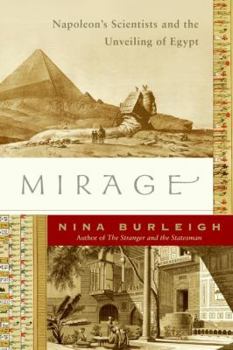Mirage: Napoleon's Scientists and the Unveiling of Egypt
Select Format
Select Condition 
Book Overview
Little more than two hundred years ago, only the most reckless or eccentric Europeans had dared traverse the unmapped territory of the modern-day Middle East. Its history and peoples were the subject of much myth and speculation--and no region aroused greater interest than Egypt, where reports of mysterious monuments, inscrutable hieroglyphics, rare silks and spices, and rumors of lost magical knowledge tantalized dreamers and taunted the power-hungry.
It was not until 1798, when an unlikely band of scientific explorers traveled from Paris to the Nile Valley, that Westerners received their first real glimpse of what lay beyond the Mediterranean Sea.
Under the command of Napoleon Bonaparte and the French Army, a small and little-known corps of Paris's brightest intellectual lights left the safety of their laboratories, studios, and classrooms to embark on a thirty-day crossing into the unknown--some never to see French shores again. Over 150 astronomers, mathematicians, naturalists, physicists, doctors, chemists, engineers, botanists, artists--even a poet and a musicologist--accompanied Napoleon's troops into Egypt. Carrying pencils instead of swords, specimen jars instead of field guns, these highly accomplished men participated in the first large-scale interaction between Europeans and Muslims of the modern era. And many lived to tell the tale.
Hazarding hunger, hardship, uncertainty, and disease, Napoleon's scientists risked their lives in pursuit of discovery. They approached the land not as colonizers, but as experts in their fields of scholarship, meticulously categorizing and collecting their finds--from the ruins of the colossal pyramids to the smallest insects to the legendary Rosetta Stone.
Those who survived the three-year expedition compiled an exhaustive encyclopedia of Egypt, twenty-three volumes in length, which secured their place in history as the world's earliest-known archaeologists. Unraveling the mysteries that had befuddled Europeans for centuries, Napoleon's scientists were the first to document the astonishing accomplishments of a lost civilization--before the dark shadow of empire-building took Africa and the Middle East by storm.
Internationally acclaimed journalist Nina Burleigh brings readers back to a little-known landmark adventure at the dawn of the modern era--one that ultimately revealed the deepest secrets of ancient Egypt to a very curious continent.






